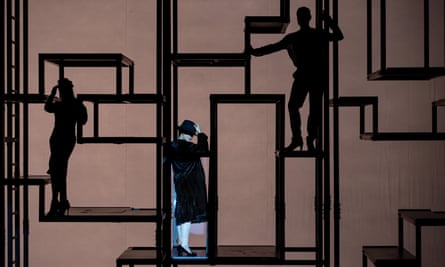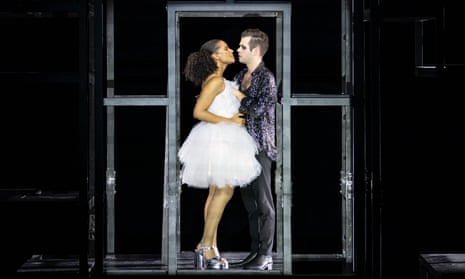Macheath, AKA Mack the Knife, has been imprisoned. The chain holding him captive spools out across his cell, long enough to let him come right to the edge of the stage. Being the restless sort, that is exactly what he does.
Played by Gabriel Schneider in Barrie Kosky’s Berliner Ensemble production, he is a lithe, punky sociopath in black vest and charcoaled eyes, somehow maintaining his outsider status despite a voice that is warm and rounded. You can see his appeal to the women he so effortlessly seduces, even as you recognise him as the most slippery of antiheroes.
With typical swagger, he bounds forward, only to face Lorenz Jansky blasting his trumpet from the orchestra pit. Macheath’s whole body undulates in a cartoon-like tremble – brass as an offensive weapon.
As well as being funny, it is characteristic of a production of the 1928 Brecht/Weill/Hauptmann “play with music” that never lets us forget we are in a theatre. It is in the way the exploitative entrepreneur Jonathan Jeremiah Peachum (a suave Tilo Nest) is interrupted by the voices of beggars in the auditorium.
It is in the way the stage extends on to the top of Adam Benzwi’s grand piano (the musical director’s harmonium is safely to one side), allowing the performers to take cabaret-style turns as if craving the spotlight.

And, it is in the way Rebecca Ringst’s superb stage design resists naturalism. The show, opens with a shimmering glitter curtain – dazzlingly lit by Ulrich Eh – an outsize parody of the superficial excess of Berlin cabaret. From within it, Josefin Platt appears as if floating in midair, just a silvery moon of a face, to sing Mack the Knife (a tune that prowls through the production), setting the band’s pace with her own fractured rhythm.
The curtain makes way for a climbing frame of steps, floors and surfaces that force the singers into confined corners, squeezing themselves from one section to the next. They stand, lie or crouch at odd angles to each other, held in an imaginative space that, following good Brechtian principles, denies the illusion of reality.
The monochrome landscape inspired by German expressionist cinema is thrown into relief only by the clashing colours worn by the rivals for Macheath’s affections. As Polly Peachum, Cynthia Micas has a dignity and assurance that belies her first appearance in an infantilising white tutu, while Amelie Willberg as Lucy cannot contain the childlike exuberance beneath her proud exterior.
Kosky’s forthright staging is not out to seduce us, rather to highlight the isolation of a group of people who could never be called a community. “Weill wrote about the loneliness of the German city,” notes Kosky in a programme note. If the work’s political ramifications are muted, it is no less a bright and adventurous staging of a landmark show.

Comments (…)
Sign in or create your Guardian account to join the discussion